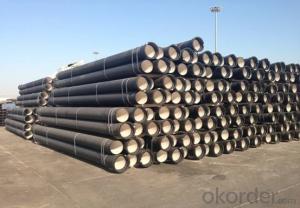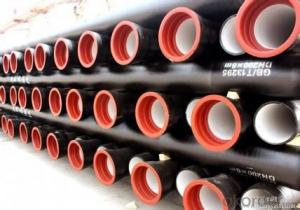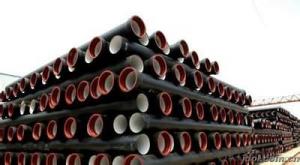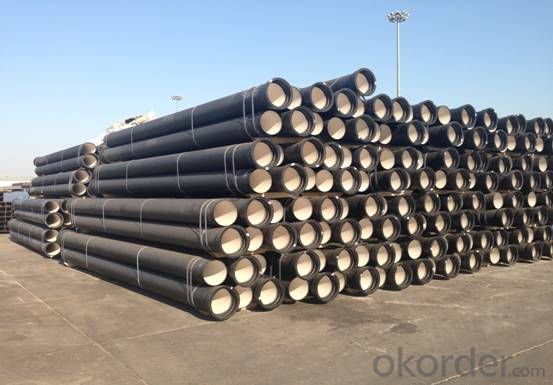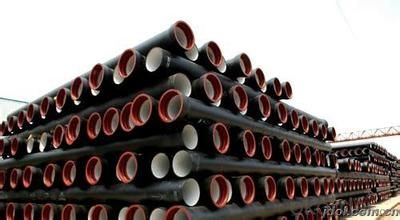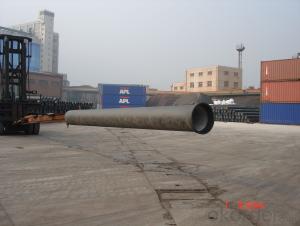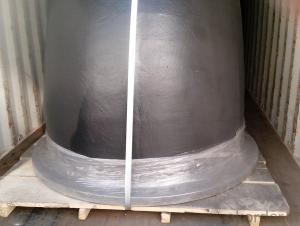DUCTILE IRON PIPE C Class DN1400
- Loading Port:
- China Main Port
- Payment Terms:
- TT OR LC
- Min Order Qty:
- -
- Supply Capability:
- -
OKorder Service Pledge
OKorder Financial Service
You Might Also Like
Ductile Iron Cast Pipe is without any defects compare with tradition casting tech, which has many advantages particularly as follow:
(1) High density. In the "vertical upward casting" process, the melt iron of centre liquid column in center crystallizer is continuously feeding for volume shrinkage caused by condensation tube at outer circumference , which lead to be free of shrinkage porosity.
(2) High purity. When melt iron pouring, the mixed impurities such as gas, dross, sand grain which are lighter than melt iron could be eliminated at furnace mouth, its impossible to enter into the crystallizer through the channel, so the melt iron into the crystallizer is very pure.
(3) Strength with toughness. The cooling speed provided by continuous crystallizer is 30 times than sand casting and 5 times than centrifugal casting, and doesn't produce white iron, the eutectic cell volume of continuous cast iron is one eighth to one tenth compare with traditional cast iron. The density of graphite nodule in ductile iron can reach 300-700 pcs/mm2. Therefore, all reason above improve the strength and toughness of continuous cast iron.
(4) Free machining. The high speed cooling make the hardening phase (such as boride, steadite) not appear like reticular, massive or thick, but diffuse like fish bone and pane in shape, moreover, there are tiny graphite flakes inlaid hardening phase. It's free machining in BrinellHardness the range of 250-300HB. However, the Brinell Hardness of 250 is top limit to common metal materials.
(5) Uniform composition of tube wall. The convection mixing of liquid column caused by marching type drawing in crystallizer make the composition of tube wall well-distributed, and concentration gradient very little.
(6) High productivity. To the wall thickness of tube under 10mm, the speed of continuous casting is 1 meter/min, to the wall thickness of tube under 20mm, the speed of continuous casting is 0.5 meter/min, which is high efficiency that centrifugal or other casting tech couldn't reach.
- Q: What are the lubricants for the installation of ductile iron pipes for tap water?
- When choosing lubricant, it is necessary to consider the movement of friction pairs, materials, surface roughness, working environment and working conditions, as well as the performance of lubricants. In mechanical equipment, lubricants are mostly distributed by lubrication to the parts that need lubrication.
- Q: Can ductile iron pipes be used for irrigation systems in saline soil conditions?
- Yes, ductile iron pipes can be used for irrigation systems in saline soil conditions. Ductile iron pipes are known for their durability and corrosion resistance, making them suitable for various soil conditions, including saline soil. Saline soil contains high levels of salt, which can cause corrosion and deterioration of certain materials. However, ductile iron pipes have a protective coating, such as cement mortar lining or polyethylene encasement, which provides an additional layer of protection against corrosion. This ensures that the pipes can withstand the corrosive effects of saline soil and maintain their structural integrity over a long period of time. Additionally, ductile iron pipes have a high tensile strength, making them resistant to cracks and breaks, which is important for irrigation systems that require a continuous and reliable water supply. Therefore, ductile iron pipes are a suitable choice for irrigation systems in saline soil conditions.
- Q: The benefits of ductile iron castings
- Its performance is close to carbon steel, but it has good casting performance, easy molding, better machinability than cast steel, better heat resistance, corrosion resistance and wear resistance than steel. And a very important one: cheap.
- Q: What is the expected joint restraint method for ductile iron pipes?
- The expected joint restraint method for ductile iron pipes is typically mechanical joints or push-on joints. These joints provide a secure and leak-free connection between the pipes, ensuring the stability and integrity of the pipeline system. Mechanical joints involve the use of rubber gaskets and bolts to tightly seal the joint, while push-on joints utilize a groove and rubber gasket system to create a watertight seal. Both methods offer excellent joint restraint capabilities, allowing for the effective transmission of fluids or gases through the pipeline without the risk of joint separation or failure. Additionally, these joint restraint methods also facilitate ease of installation and maintenance, making them a preferred choice for ductile iron pipe systems.
- Q: Can ductile iron pipes be used for underground compressed air systems?
- Yes, ductile iron pipes can be used for underground compressed air systems. Ductile iron is known for its strength and durability, making it suitable for handling high-pressure air. Additionally, ductile iron pipes have good resistance to corrosion and can withstand the underground environment, making them a reliable choice for compressed air systems.
- Q: Are ductile iron pipes suitable for trenchless pipe bursting methods?
- Yes, ductile iron pipes are suitable for trenchless pipe bursting methods. They have the necessary strength and flexibility to be effectively burst and replaced without the need for extensive excavation.
- Q: Can ductile iron pipes be used for underground mining applications?
- Underground mining applications can indeed utilize ductile iron pipes. Ductile iron, renowned for its robustness, is capable of enduring the demanding conditions and weighty burdens that mining ventures entail. This material exhibits remarkable resistance to corrosion and possesses the capacity to withstand high-pressure and high-temperature settings. Furthermore, ductile iron pipes offer flexibility, facilitating effortless installation and maintenance, rendering them fitting for underground mining applications that prioritize mobility and adaptability. In summary, ductile iron pipes present a dependable and economical option for underground mining operations.
- Q: Do ductile iron pipes require pressure testing before installation?
- Yes, ductile iron pipes do require pressure testing before installation. Pressure testing is a crucial step in ensuring the integrity and safety of the pipes. It helps to identify any leaks, weak spots, or defects in the pipes before they are put into service. Pressure testing involves subjecting the pipes to higher than normal operating pressures to check if they can withstand the expected pressure without any failure. This process helps to prevent potential issues such as leaks, bursts, or failures that could lead to water loss, property damage, or even accidents. Therefore, pressure testing is an essential requirement for ductile iron pipes to ensure their reliability and long-term performance.
- Q: Are ductile iron pipes compatible with other pipe materials?
- Yes, ductile iron pipes are generally compatible with other pipe materials. Ductile iron pipes have a high level of flexibility and strength, making them suitable for connecting with different pipe materials such as PVC, HDPE, and steel. Transition fittings are commonly used to connect ductile iron pipes to other materials, ensuring a secure and leak-free joint. It is important to adhere to industry standards and guidelines when connecting different pipe materials to ensure compatibility and maintain the integrity of the pipeline system.
- Q: Is the water cast iron pipe 100% for hydrostatic test?
- After the site installation, according to the standard to test pressure, but a lot of construction units are not pressure test
Send your message to us
DUCTILE IRON PIPE C Class DN1400
- Loading Port:
- China Main Port
- Payment Terms:
- TT OR LC
- Min Order Qty:
- -
- Supply Capability:
- -
OKorder Service Pledge
OKorder Financial Service
Similar products
Hot products
Hot Searches
Related keywords
